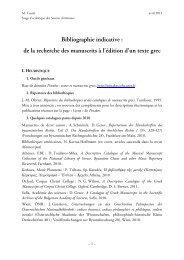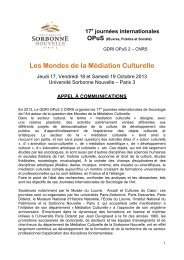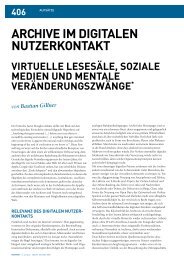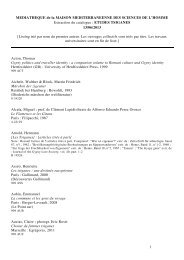«The governance of water policy in Italy» - 1
«The governance of water policy in Italy» - 1
«The governance of water policy in Italy» - 1
You also want an ePaper? Increase the reach of your titles
YUMPU automatically turns print PDFs into web optimized ePapers that Google loves.
Athens European Week, Autumn 2011<br />
«European <strong>water</strong> and sanitation services vs susta<strong>in</strong>able development?»<br />
AgroParisTech ENGREF – Ecole des Ponts ParisTech<br />
Paris, November 15, 2011<br />
<strong>«The</strong> <strong>governance</strong> <strong>of</strong> <strong>water</strong> <strong>policy</strong><br />
<strong>in</strong> <strong>Italy»</strong><br />
Legal framework, processes and outcomes<br />
Andrea Lippi,<br />
DISPO & CIRES<br />
University <strong>of</strong> Florence<br />
Andrea Lippi – DISPO &<br />
CIRES 2011
Contents<br />
for a Political Science po<strong>in</strong>t <strong>of</strong> view<br />
1. Water and sanitation services (WSS) <strong>policy</strong> In Italy before 1994<br />
1. WSS <strong>policy</strong> design <strong>in</strong> Italy: Galli Law and follow<strong>in</strong>g legislation.<br />
1. Implementation (1995-2011).<br />
1. Current picture <strong>in</strong> the <strong>governance</strong> <strong>of</strong> WSS<br />
1. Discussion and remarks<br />
Andrea Lippi – DISPO &<br />
CIRES 2011
The WSS <strong>policy</strong> <strong>in</strong> Italy<br />
before 1994<br />
Andrea Lippi – DISPO &<br />
CIRES 2011
Italian WSS before 1994<br />
• Water <strong>in</strong>dustry fragmentation : over 13,000 undertak<strong>in</strong>gs plus a<br />
prom<strong>in</strong>ent role <strong>of</strong> public entities.<br />
• shared <strong>governance</strong> <strong>of</strong> <strong>water</strong> <strong>policy</strong> :<br />
• State and Regions : framework plann<strong>in</strong>g<br />
• municipalities : budget and WSS delivery<br />
• WSS : not an <strong>in</strong>dependent and structured <strong>policy</strong> sector.<br />
• outdated Water management, technology and f<strong>in</strong>ancial pr<strong>of</strong>ile<br />
• Low cost recovery, generat<strong>in</strong>g bad performances.<br />
Andrea Lippi – DISPO &<br />
CIRES 2011
The <strong>water</strong> <strong>in</strong>dustry before 1994<br />
Management Waterworks All <strong>water</strong> services<br />
Municipalities (direct management) 80,13 82,58<br />
Municipal firms and/or consortia 10,42 8,11<br />
Public law companies 0,60 0,68<br />
Private law companies 2,80 2,75<br />
Others 6,04 5,88<br />
Total 100,00 100,00<br />
N (4.635) (7.826)<br />
Andrea Lippi – DISPO &<br />
CIRES 2011
WSS <strong>policy</strong> design <strong>in</strong> Italy :<br />
the Galli Law (L.36/94) and<br />
follow<strong>in</strong>g legislation<br />
Andrea Lippi – DISPO &<br />
CIRES 2011
The Galli Law (L.36/1994)˫<br />
•Vertical <strong>in</strong>tegration <strong>of</strong> <strong>water</strong> management, reduc<strong>in</strong>g the<br />
fragmentation <strong>of</strong> responsibilities <strong>in</strong> the whole <strong>water</strong> cycle from<br />
source to disposal, thus establish<strong>in</strong>g an “Integrated Water<br />
Service” (IWS).<br />
•Regulatory approach through a clear-cut separation <strong>of</strong> <strong>water</strong><br />
services from the range <strong>of</strong> direct public-adm<strong>in</strong>istrative<br />
activities to improve the <strong>water</strong> and sanitation services from a<br />
technological po<strong>in</strong>t <strong>of</strong> view (<strong>in</strong>dustrialisation) and to make<br />
them more efficient.<br />
•Water sector <strong>in</strong>dependent <strong>of</strong> the fiscal system so that it could<br />
operate on the sole source <strong>of</strong> <strong>in</strong>come deriv<strong>in</strong>g from tariffs.<br />
•Introduction <strong>of</strong> an end-user tariff <strong>policy</strong> grant<strong>in</strong>g full<br />
autonomy to the <strong>water</strong> <strong>in</strong>dustry, cover<strong>in</strong>g full costs: runn<strong>in</strong>g<br />
expenses as well as ma<strong>in</strong>tenance, restoration, <strong>in</strong>novation and a<br />
call for private <strong>in</strong>vestments.<br />
Andrea Lippi – DISPO &<br />
CIRES 2011
Regulation <strong>in</strong>duced by Galli Law ˫<br />
� A national non-<strong>in</strong>dependent Regulator (COVIRI) provid<strong>in</strong>g the<br />
def<strong>in</strong>ition <strong>of</strong> m<strong>in</strong>imum quality targets and price sett<strong>in</strong>g rules<br />
� Regions charged to set the boundaries <strong>of</strong> “Optimal <strong>water</strong><br />
districts” (Ambiti territoriali ottimali, ATO), namely <strong>in</strong>novative<br />
territorial areas with<strong>in</strong> which the IWS would be implemented.<br />
�Creation <strong>of</strong> Authorities <strong>in</strong> each ATO <strong>in</strong> order to<br />
� carry out a survey on the state <strong>of</strong> <strong>in</strong>frastructure and levels <strong>of</strong> service,<br />
� draw up an <strong>in</strong>vestment and tariff plan,<br />
� entrust a service provider with the concession,<br />
� exercise steer<strong>in</strong>g and control over the WSS concessionaire.<br />
Andrea Lippi – DISPO &<br />
CIRES 2011
The ATO's role: plann<strong>in</strong>g and control<br />
The legal framework entitled the Authorities (AATOs) to<br />
become the Regulator <strong>of</strong> the IWS as planners and<br />
controllers, while the service (distribution and sewerage)<br />
management was delegated to <strong>in</strong>dustrial players through a<br />
concession:<br />
•PLANS: the ATOs must draft a periodical WSS plan,<br />
focuss<strong>in</strong>g particularly on tariffs, <strong>in</strong>vestments and<br />
strategies.<br />
•CONTROLS: the ATOs are called to monitor service<br />
providers' performance and their compliance to the<br />
contractual conditions fixed by the plans, especially<br />
concern<strong>in</strong>g tariffs and <strong>in</strong>vestments .<br />
Andrea Lippi – DISPO &<br />
CIRES 2011
Tariffs regulation <strong>in</strong> the Galli Law ˫<br />
•Tariffs’ standard is full cost recovery (OPEX and CAPEX) and<br />
the achievement <strong>of</strong> f<strong>in</strong>ancial equilibrium;<br />
• Tariffs follow a price cap criterion<br />
• In 1996 the Metodo Tariffario Normalizzato (MTN) was set,<br />
fix<strong>in</strong>g a standard <strong>of</strong> 7% for capital remuneration<br />
•S<strong>in</strong>ce 1996 the MTN has never been updated by the M<strong>in</strong>istry<br />
<strong>of</strong> Environment.<br />
Andrea Lippi – DISPO &<br />
CIRES 2011
Expected Governance by Galli Law<br />
STATE:<br />
- Galli Law<br />
- norms on tariffs<br />
- m<strong>in</strong>imum standards <strong>of</strong><br />
service<br />
- National Authority<br />
Municipalities ���� ATO AUTHORITIES:<br />
- survey on service and <strong>in</strong>frastructure<br />
- plann<strong>in</strong>g <strong>of</strong> service and <strong>in</strong>vestments<br />
- award<strong>in</strong>g <strong>of</strong> concession<br />
- control over service provider<br />
REGIONS:<br />
- Regional Law def<strong>in</strong><strong>in</strong>g:<br />
o territory <strong>of</strong> ATO’s<br />
o structure <strong>of</strong> ATO Authorities<br />
o coord<strong>in</strong>ation <strong>of</strong> ATO’s<br />
���� concession contract ����<br />
Andrea Lippi – DISPO &<br />
CIRES 2011<br />
SERVICE PROVIDERS:<br />
- service provision<br />
regulation and control �<br />
���� <strong>in</strong>formation
Further regulation<br />
2001 The Italian government <strong>in</strong>troduced norms that compelled<br />
municipalities to award concessions through competitive<br />
procedures and required all service providers awarded concessions<br />
non-competitively to be privatized.<br />
2002 Infr<strong>in</strong>gement procedure aga<strong>in</strong>st budget law norms on competitive<br />
tender<strong>in</strong>g and <strong>in</strong>-house provid<strong>in</strong>g<br />
2003 Revision <strong>of</strong> norms on competitive tender<strong>in</strong>g toward '<strong>in</strong> house'<br />
2004 Restrictive <strong>in</strong>terpretations <strong>of</strong> the <strong>in</strong>-house clause by Council <strong>of</strong> State<br />
and by Antitrust Authority (see the ECJ) decision that states that<br />
direct, non competitive award <strong>of</strong> concessions is only permitted<br />
when the local authority exercises over the concessionaire “a<br />
control which is similar to that which it exercises over its own<br />
departments”, and the concessionaire carries out “the essential part<br />
<strong>of</strong> its activities with the controll<strong>in</strong>g local authority or authorities”.<br />
2006 Decree 152 is discussed <strong>in</strong> parliament on <strong>water</strong> and waste<br />
management<br />
2008 L. 133: compulsive competitive tender<strong>in</strong>g (with exceptions)<br />
2009 Decree 135 'Ronchi': compulsive competitive tender<strong>in</strong>g<br />
2010 Law 42: abolition <strong>of</strong> ATO for <strong>water</strong> and waste management<br />
Andrea Lippi – DISPO &<br />
CIRES 2011
<strong>water</strong> <strong>policy</strong> <strong>governance</strong>:<br />
Legal power and stakeholders<br />
� The State regulates tariffs and standards: oversight assigned to a special<br />
committee with<strong>in</strong> the M<strong>in</strong>istry <strong>of</strong> Environment (COVIRI).<br />
� The Regions adjust the national framework to the local context ; shape<br />
boundaries ; create ATO's Authorities for plann<strong>in</strong>g and control.<br />
� The Authorities group municipalities (on average 83 per ATO) <strong>in</strong> a political<br />
body : the assembly, which elects an executive board and a President.<br />
� Operations delegated after tender to a concessionaire for 20 years. The<br />
service provider must be a company (public or private or mixed economy).<br />
The concession should provide for a recruitment <strong>of</strong> private <strong>in</strong>vestors.<br />
� The Authorities plan <strong>in</strong>vestments and government strategies for WSS on the<br />
ATO territory. Successively, they are called for a control on <strong>in</strong>vestment,<br />
service management and tariffs.<br />
Andrea Lippi – DISPO &<br />
CIRES 2011
<strong>water</strong> <strong>policy</strong> <strong>governance</strong> s<strong>in</strong>ce 2008<br />
Acts n. 112/2008 and n.135/2009<br />
Right w<strong>in</strong>g majority led by Mr. Berlusconi set that :<br />
•WSS currently managed '<strong>in</strong> house' should be sent on tender by 2013;<br />
•But municipalities can avoid the tender (and keep the <strong>in</strong> house provision)<br />
•Then they must select one <strong>of</strong> the three follow<strong>in</strong>g alternatives:<br />
a. demonstrate that the current <strong>in</strong> house provision is more<br />
efficient than a concession;<br />
b. sell 60% <strong>of</strong> stock <strong>of</strong> the current public companies;<br />
c. keep the current concession go<strong>in</strong>g (if the provider is a jo<strong>in</strong>t<br />
stock company), but sell 70% <strong>of</strong> stock to private <strong>in</strong>vestors.<br />
In any case, municipalities can cont<strong>in</strong>ue to sell the concession through tender<br />
to private or public or mixed provider or to sell a percentage <strong>of</strong> stocks.<br />
Andrea Lippi – DISPO &<br />
CIRES 2011
Reaction: the referenda (June 2011)˫<br />
S<strong>in</strong>ce 2009 an emerg<strong>in</strong>g coalition <strong>of</strong> approximatively 299 different<br />
groups* gathered a popular petition call<strong>in</strong>g for a referendum about<br />
<strong>water</strong> <strong>policy</strong>. The petition was approved by the Supreme Court<br />
and the referendum took place on 12 and 13 June<br />
In fact, there were two different referenda aga<strong>in</strong>st regulations<br />
issued from Laws 152/2006 and 112/2008. They proposed:<br />
1. To abrogate the compulsive competitive tender<strong>in</strong>g and keep the<br />
'<strong>in</strong>-house' management whenever the marketisation is not<br />
workable (Art. 23 bis, Decree n.112 <strong>of</strong> 25 June 2008);<br />
2. To abrogate the capital remuneration fixed by the price cap.<br />
* environmental associations, left-w<strong>in</strong>g movements, trade unions, consumer<br />
protection associations, confessional associations and catholic Church, a party,<br />
newspapers and magaz<strong>in</strong>es, cultural associations etc.<br />
Andrea Lippi – DISPO &<br />
CIRES 2011
The electoral result <strong>of</strong> June 2011<br />
� Both referenda were approved by the electoral body, achiev<strong>in</strong>g the legal<br />
participation level, and respectively ga<strong>in</strong><strong>in</strong>g 95,3% and 95,8% <strong>of</strong> votes.<br />
� The electoral result contributed to dismantle the regulatory design <strong>of</strong><br />
the Acts n.112/08 and 135/09, namely by the current Government.<br />
� Legally, the referenda moved back the concession regime to the Galli<br />
Law <strong>in</strong>itial framework.<br />
� Empirically, they radically changed <strong>water</strong> politics and <strong>policy</strong> agenda<br />
because they de-legitimized any political <strong>in</strong>tention to push <strong>water</strong><br />
<strong>governance</strong> toward a more privatized approach.<br />
� Instead, they created the political opportunity for legal <strong>in</strong>novation,<br />
call<strong>in</strong>g for a different updat<strong>in</strong>g <strong>of</strong> the <strong>in</strong>itial Galli Law framework.<br />
Andrea Lippi – DISPO &<br />
CIRES 2011
A contradictory and ambiguous legal framework<br />
• On the one hand, the legal framework compelled municipalities to award<br />
concessions through competitive procedures and called for a privatisation <strong>of</strong> all<br />
service providers<br />
• On the other hand, it kept the possibility for an <strong>in</strong> house concession<br />
• Both solutions (<strong>in</strong> house and cmpetition, public delegation and private<br />
players) are co – exist<strong>in</strong>g and stratified along more than ten years.<br />
• Lastly, the basic regulatory adm<strong>in</strong>istrative unit (the ATO's) has been abolished<br />
through Law 42/2010 engender<strong>in</strong>g additional uncerta<strong>in</strong>ty.<br />
•Additionally the National Committee, that worked as a weak Regulator, was<br />
retrograded to a Commission without any legal power <strong>of</strong> oversight.<br />
Piecemeal and contradictory legislation susta<strong>in</strong>ed competitive tender<strong>in</strong>g and<br />
reduced its scope at the same time, generat<strong>in</strong>g ambiguity <strong>in</strong>stead <strong>of</strong> a clearer<br />
legal framework, and partially dismantl<strong>in</strong>g the genu<strong>in</strong>e <strong>governance</strong> design<br />
<strong>in</strong>duced by the Galli Law.<br />
Andrea Lippi – DISPO &<br />
CIRES 2011
Implementation and outcomes<br />
(1994-2011)˫<br />
Andrea Lippi – DISPO &<br />
CIRES 2011
Return on implementation (1995-2011)˫<br />
A jeopardized process<br />
•In general, the implementation <strong>of</strong> the Galli Law (and <strong>of</strong> the<br />
subsequent Acts) was not coord<strong>in</strong>ated by an unique player. It didn't<br />
deal with a top down process, but with a bottom up one .<br />
•It revealed a significant localistic <strong>in</strong>cl<strong>in</strong>ation to emphasize<br />
resources and strategies <strong>in</strong> implementation (tim<strong>in</strong>g, legal form for<br />
ATO, ATO's boundaries, strategy for award<strong>in</strong>g) <strong>in</strong>duced by the<br />
current situation <strong>in</strong> each region.<br />
•As a result, the <strong>policy</strong> design has been shaped accord<strong>in</strong>g to the<br />
social, political, economical and cultural features <strong>of</strong> each Region and<br />
reflect<strong>in</strong>g its capabilities or its limits. This way, the dynamics<br />
resulted as a decisive <strong>in</strong>dependent variable for the <strong>policy</strong><br />
outcome.<br />
Andrea Lippi – DISPO &<br />
CIRES 2011
A slow and localistic process<br />
Evidence about geography <strong>of</strong> implementation<br />
•Tim<strong>in</strong>g and nature <strong>of</strong> implementation vary from one area <strong>of</strong> Italy to another.<br />
• In the North : highest concentration <strong>of</strong> municipal companies s<strong>in</strong>ce the early<br />
twentieth century. Municipalities own their company => stronghold <strong>of</strong> localism<br />
and fragmentation <strong>of</strong> local utility management => the reform encountered<br />
resistance because <strong>of</strong> the strong autonomy <strong>of</strong> municipal enterprises<br />
• In the Centre : municipal enterprises <strong>of</strong> this k<strong>in</strong>d are rather less present. WSS<br />
mostly undertaken by municipal authorities directly. implementation <strong>of</strong> formal<br />
procedures and a large number <strong>of</strong> present concessions came about earlier than <strong>in</strong><br />
other areas <strong>of</strong> Italy<br />
• In Southern Italy a culture <strong>of</strong> “formal compliance” evidenced: the various steps<br />
(sett<strong>in</strong>g up <strong>of</strong> Authorities, survey <strong>of</strong> <strong>in</strong>frastructures, def<strong>in</strong>ition <strong>of</strong> <strong>in</strong>vestment plans)<br />
had all been accomplished under a formal pr<strong>of</strong>ile with a strong coord<strong>in</strong>at<strong>in</strong>g role<br />
from the M<strong>in</strong>istries.<br />
Andrea Lippi – DISPO &<br />
CIRES 2011
Four different strategies for award<strong>in</strong>g<br />
In spite <strong>of</strong> the procedure, the Ato's positively awarded the concessions<br />
through four different strategies:<br />
a. Directly through the tender (concession to providers);<br />
b. Directly to Public Private Partnership (PPP);<br />
c. Indirectly to PPP award<strong>in</strong>g a percentage <strong>of</strong> stocks;<br />
d. to Public companies ('<strong>in</strong> house').<br />
Dynamics Players<br />
a) tender Private firms or jo<strong>in</strong>t<br />
ventures to compete for<br />
award<br />
b) Direct concession to PPP Public Private Partenrship<br />
(municipalities + others)<br />
c) direct concession to former<br />
public firm<br />
c1) tender for 49% <strong>of</strong> stocks<br />
c2) <strong>in</strong> house Public companies<br />
Andrea Lippi – DISPO &<br />
CIRES 2011
Forms <strong>of</strong> award <strong>of</strong> concession:<br />
Theoretical vs real<br />
Forms o f a wa rd o f concession chosen and im p lem en te d<br />
Formal choice<br />
<strong>of</strong> model<br />
Concession<br />
started<br />
Andrea Lippi – DISPO &<br />
CIRES 2011<br />
Actual<br />
ownership<br />
Private<br />
( c ompetition )<br />
11 4 4<br />
Mixed 33 25 14<br />
Public 13 12 23
The process : 2009 update<br />
• The regional ATO’s were 91+1 (<strong>in</strong>ter regional), while the<br />
updated number <strong>of</strong> <strong>in</strong>stituted Authorities for the universe was<br />
91<br />
• The concessions to service providers were awarded for 69/91<br />
ATO’s (67 <strong>in</strong> 2007): 23 ATO’s never awarded the concession<br />
• The service providers were 114 on the national territory<br />
• 34% <strong>of</strong> users <strong>in</strong> Italy still don’t experience the tariffs regime<br />
<strong>in</strong>duced by the Galli Law<br />
• The MTN has never been updated<br />
• ATO’s have been dismantled<br />
• The National Authority has been downgraded from a<br />
supervis<strong>in</strong>g committee to an advisory commission<br />
Andrea Lippi – DISPO &<br />
CIRES 2011
The current picture <strong>in</strong> the<br />
<strong>governance</strong> <strong>of</strong> <strong>water</strong> and<br />
sanitation services<br />
Andrea Lippi – DISPO &<br />
CIRES 2011
Local factors<br />
Results: an altered <strong>governance</strong><br />
STATE:<br />
- Galli Law<br />
- norms on tariffs<br />
- m<strong>in</strong>imum standards <strong>of</strong><br />
service<br />
- National Authority<br />
Municipalities ���� ATO AUTHORITIES:<br />
- survey on service and <strong>in</strong>frastructure<br />
- plann<strong>in</strong>g <strong>of</strong> service and <strong>in</strong>vestments<br />
- award<strong>in</strong>g <strong>of</strong> concession<br />
- control over service provider<br />
Andrea Lippi – DISPO &<br />
CIRES 2011<br />
REGIONS:<br />
- Regional Law def<strong>in</strong><strong>in</strong>g:<br />
o territory <strong>of</strong> ATO’s<br />
o structure <strong>of</strong> ATO Authorities<br />
o coord<strong>in</strong>ation <strong>of</strong> ATO’s<br />
� concession contract �<br />
regulation and control �<br />
� <strong>in</strong>formation<br />
SERVICE PROVIDERS:<br />
- service provision
The <strong>policy</strong> <strong>governance</strong> <strong>in</strong> 2011<br />
The current situation depicts a chang<strong>in</strong>g picture with a lot <strong>of</strong><br />
uncerta<strong>in</strong>ties and ambiguities <strong>in</strong>fluenc<strong>in</strong>g an altered <strong>water</strong> <strong>governance</strong>:<br />
- The separation between regulator and service provider has been biased<br />
by the fact that the ATO's have been abolished. It deals with a Regulation<br />
without regulators. They have to be substituted by the Regions (<strong>in</strong> some<br />
case it already happened).<br />
- The award<strong>in</strong>g <strong>of</strong> concession has been radically made confused and<br />
unclear by a redundant and ambiguous legislation that <strong>in</strong>troduced<br />
criteria quite different from the orig<strong>in</strong>al <strong>policy</strong> design, on the one side,<br />
and by the recent referenda, that partially abrogated the changes, on the<br />
other. At the moment, it deals with a transition toward an unknown.<br />
- The current <strong>governance</strong> is the effect <strong>of</strong> an adjustment process between<br />
the logics <strong>of</strong> the Galli Law design and the local social, political,<br />
economical and cultural contexts. It emphasized some perverse side<br />
effects, like the conflict <strong>of</strong> <strong>in</strong>terests <strong>of</strong> mayor contemporaneously sitt<strong>in</strong>g<br />
<strong>in</strong> the ATO Assembly and <strong>in</strong> the service provider's board.<br />
Andrea Lippi – DISPO &<br />
CIRES 2011
State <strong>of</strong> Art 2011 (CONVIRI, 2009)˫<br />
At the end <strong>of</strong> 2008 the <strong>governance</strong> <strong>of</strong> <strong>water</strong> <strong>policy</strong> <strong>in</strong> Italy was runn<strong>in</strong>g.<br />
• Plann<strong>in</strong>g by the ATOs Assemblies was improved with respect to<br />
ten years before, even if it was still so fragmented as a shopp<strong>in</strong>g<br />
list and poorly operable for service providers.<br />
• The ATOs showed a lack <strong>of</strong> expertise and <strong>of</strong> power <strong>of</strong> control with<br />
regard to the service providers. It testifies for an <strong>in</strong>formational<br />
asymmetry between regulator and players. The last one are still<br />
stronger than authorities <strong>in</strong> terms <strong>of</strong> knowledge, contacts,<br />
employees and so on. No explicit benchmark<strong>in</strong>g activity has been<br />
implemented on the national territory. The most part <strong>of</strong> data for<br />
external control by ATOs is furnished by the assessed providers....<br />
• More than 50% <strong>of</strong> concessions is <strong>in</strong> house through public<br />
companies.<br />
• Mayors are engaged <strong>in</strong> a conflict <strong>of</strong> <strong>in</strong>terest as stock owners for<br />
service providers, on the one hand, as well as members <strong>of</strong> the<br />
Regulation Authorities, on the other.<br />
Andrea Lippi – DISPO &<br />
CIRES 2011
Results: what went wrong (I)˫<br />
The orig<strong>in</strong>al design <strong>of</strong> economic regulation is embedded<br />
<strong>in</strong> a political system result<strong>in</strong>g as a dependent variable<br />
Most decisions are negotiated and made outside ATO's assemblies, while<br />
these bodies are only called upon to ratify them. It is hard to generalise<br />
where actual decisions are made rather than <strong>in</strong> ATO's assemblies, but<br />
local party organisations, bilateral agreements between mayors,<br />
prov<strong>in</strong>cial adm<strong>in</strong>istrations, and most <strong>of</strong> all pre-exist<strong>in</strong>g public<br />
enterprises – their boards <strong>of</strong> governors, and their <strong>in</strong>dustrial associations<br />
– represent some <strong>of</strong> the most important arenas for the decisions made <strong>in</strong><br />
the ATOs.<br />
Andrea Lippi – DISPO &<br />
CIRES 2011
Results: what went wrong (II)˫<br />
Localism has been strengthened <strong>in</strong>stead <strong>of</strong> be<strong>in</strong>g<br />
reduced<br />
The proliferation <strong>of</strong> appo<strong>in</strong>tments (presidents and<br />
members <strong>of</strong> boards <strong>of</strong> governors) has created new<br />
opportunities for the consolidation <strong>of</strong> the local political<br />
elite, with emoluments and benefits <strong>of</strong>ten equal to those <strong>of</strong><br />
elected members <strong>of</strong> local councils; this does not<br />
necessarily favour the fulfilment <strong>of</strong> the ATO’s tasks, s<strong>in</strong>ce it<br />
may distort its ends and logics.<br />
Andrea Lippi – DISPO &<br />
CIRES 2011
Results: what went wrong (III)˫<br />
Weakness <strong>of</strong> Regulation: weak Authorities (both at national and local<br />
levels) before their abolition<br />
Authorities had to undergo a process <strong>of</strong> <strong>in</strong>stitutional learn<strong>in</strong>g to def<strong>in</strong>e their<br />
role and acquire familiarity with their new role as planners and controllers, as<br />
opposed to the previous monopolistic framework which granted mayors a<br />
vital source <strong>of</strong> consensus <strong>in</strong> <strong>water</strong> management. It meant very poor quality <strong>of</strong><br />
<strong>in</strong>vestment plans, structured as patchwork collections <strong>of</strong> localistic demands<br />
rather than as strategic documents <strong>of</strong> <strong>water</strong>-bas<strong>in</strong> plann<strong>in</strong>g, <strong>in</strong> an <strong>in</strong>ability to<br />
exercise control, and <strong>in</strong> high levels <strong>of</strong> conflict among mayors. The authorities<br />
didn't possess the technical know how needed to deal with the service<br />
provider companies, especially when these were (partly) owned by large<br />
national (former municipal enterprises) or were mult<strong>in</strong>ational (French,<br />
English and British) corporations<br />
Andrea Lippi – DISPO &<br />
CIRES 2011
Is the ownership the basic problem <strong>of</strong><br />
the current <strong>governance</strong>?<br />
Currently, <strong>in</strong> Italy we are deal<strong>in</strong>g with a radical debate about<br />
public or private <strong>in</strong> <strong>water</strong> service and sanitation: which has to be<br />
considered as better?<br />
The basic problem is not (or not only) the legal nature <strong>of</strong><br />
ownership. Public has to be also considered <strong>in</strong> terms <strong>of</strong> Kant<br />
mean<strong>in</strong>g: democratic access.<br />
Attend<strong>in</strong>g on this problem, the current situation displays three<br />
critical lacks:<br />
- A lack <strong>of</strong> transparency, <strong>in</strong> terms <strong>of</strong> social participation.<br />
- A lack <strong>of</strong> democratic accountability, <strong>in</strong> terms <strong>of</strong> capability to<br />
account who and why is the real decision maker.<br />
- A lack <strong>of</strong> political legitimacy, <strong>in</strong> terms <strong>of</strong> social acceptance.<br />
Andrea Lippi – DISPO &<br />
CIRES 2011
Discussion and remarks<br />
Andrea Lippi – DISPO &<br />
CIRES 2011
The ma<strong>in</strong> evidence<br />
Nor private, neither public = de – public-ization, namely an<br />
empirical hybrid and systematically not homogeneous<br />
<strong>governance</strong> on the national territory where the current regulation<br />
is adjusted to the former social, political, economical and cultural<br />
variables. The <strong>water</strong> <strong>policy</strong> is shaped on the undim<strong>in</strong>ished factors<br />
<strong>of</strong> Italian politics: localism and consensualism.<br />
Open questions<br />
Was Italy ready to implement a regulation design?<br />
To what extent is now able to implement a similar <strong>policy</strong> design?<br />
To what extent is the system able to deal with the partial<br />
dismantl<strong>in</strong>g <strong>in</strong>duced by the recent legislation and the follow<strong>in</strong>g<br />
referenda?<br />
Andrea Lippi – DISPO &<br />
CIRES 2011
Regulation as a political escape way....<br />
From a political science po<strong>in</strong>t <strong>of</strong> view, more than a<br />
deliberate strategy to set up a regulatory framework,<br />
the <strong>governance</strong> design enacted by the Galli Law (and<br />
follow<strong>in</strong>g norms), <strong>of</strong>fered Italian politicians a solution<br />
to escape away from a persistent legitimacy problem.<br />
Adopt<strong>in</strong>g an <strong>in</strong>novative and fashionable legal<br />
framework, they created a lot <strong>of</strong> expectations for a<br />
strong improvement....<br />
Andrea Lippi – DISPO &<br />
CIRES 2011
...and its un<strong>in</strong>tended consequences<br />
Unfortunately, most <strong>of</strong> the essential prerequisites were<br />
miss<strong>in</strong>g:<br />
- A cultural background for regulation, as <strong>in</strong> plann<strong>in</strong>g expertise,<br />
as well <strong>in</strong> control approach, also <strong>in</strong>clud<strong>in</strong>g a competitive<br />
weltanschauung <strong>of</strong> democracy;<br />
- An emergent market for <strong>water</strong> and sanitation service<br />
<strong>in</strong>clud<strong>in</strong>g private players, and not only (the most parts)<br />
owned by municipalities: i.e. public owners <strong>of</strong> private<br />
companies….<br />
As a result, the current picture looks as a <strong>water</strong>melon: on<br />
the surface a regulatory design, but the flesh is still<br />
consensualist, and it didn’t change as expected…<br />
Andrea Lippi – DISPO &<br />
CIRES 2011
What does <strong>water</strong> <strong>policy</strong> <strong>governance</strong><br />
presently need ?<br />
The current system needs for an <strong>in</strong>crease <strong>of</strong> legitimacy, because is<br />
partially de legitimized. It can achieved through legitimization<br />
strategies <strong>in</strong>clud<strong>in</strong>g transparency, democratic access and an<br />
improvement <strong>of</strong> the regulatory asset, also with respect to the<br />
cultural approach and the creation <strong>of</strong> expertise.<br />
It particularly perta<strong>in</strong>s to four strategies<br />
1. citizens' participation<br />
2. improvement <strong>of</strong> transparency<br />
3. benchmark<strong>in</strong>g, a (serious) control and <strong>policy</strong><br />
evaluation<br />
4. a national and unique Regulation Authority<br />
Andrea Lippi – DISPO &<br />
CIRES 2011
References by the Research group<br />
Citroni, G., Giannelli, N., Lippi, A. and Pr<strong>of</strong>eti, S. (2007) «Qui gouverne les services publics locaux?»: Des<br />
configurations variables entre secteurs public et privé dans le cas du service public de l’eau en Italie,<br />
<strong>in</strong> «Politiques et management public», 3, pp. 151-167.<br />
Citroni, G. (2007) Tra stato e mercato. L'acqua <strong>in</strong> Italia e Germania, Bonanno, Acireale / Roma.<br />
Citroni, G., Lippi, A. and Giannelli, N. (2008) Chi governa l'acqua? Studio sulla <strong>governance</strong> locale,<br />
Rubbett<strong>in</strong>o, Soveria Mannelli (CZ).<br />
Lippi, A., Giannelli, N., Pr<strong>of</strong>eti, S. and Citroni, G. (2008) Adapt<strong>in</strong>g public-private <strong>governance</strong> to the local<br />
context. the case <strong>of</strong> <strong>water</strong> and sanitation services <strong>in</strong> italy, <strong>in</strong> «Public Management Review», 10/5,<br />
pp. 619-640.<br />
Citroni, G. (2010) Neither state nor market: municipalities, corporations and municipal corporatisation<br />
<strong>in</strong> <strong>water</strong> services - Germany, France and Italy compared, <strong>in</strong> H. Wollmann and G. Marcou (ed) The<br />
Provision Of Public Services In Europe: Between State, Local Government and Market, Edward<br />
Elgar, Cheltenham, UK; pp. 191-216.<br />
Citroni, G. (2010) Une mise en oeuvre sans normes: deux décennies de réformes dans les services de<br />
l'eau en Italie <strong>in</strong> Gis-Grale-Cnrs (ed.) Les enjeux de la gestion locale de l'eau: droit et gestion des<br />
collectivités territoriales (édtion 2010) Le Moniteur, Paris; pp. 287-298.<br />
Lippi, A. Evaluat<strong>in</strong>g the "Quasi Federalist" Programme <strong>of</strong> Decentralisation <strong>in</strong> Italy s<strong>in</strong>ce the 1990s: A<br />
Side-effect Approach, <strong>in</strong> «Local Government Studies», 37/5, pp. 495-516.<br />
Citroni, G., Lippi, A. and Pr<strong>of</strong>eti, S. (2012) Remapp<strong>in</strong>g the State: Inter-Municipal Cooperation through<br />
Corporatization and Public-Private Governance Structures, <strong>in</strong> «Local Government Studies»,<br />
(forthcom<strong>in</strong>g).<br />
Citroni, G., Lippi, A. and Pr<strong>of</strong>eti, S. (2012) «Governi privati». Le società partecipate attori e arene del<br />
governo locale, Rubbett<strong>in</strong>o, Soveria Mannelli (CZ), (forthcom<strong>in</strong>g).<br />
Andrea Lippi – DISPO &<br />
CIRES 2011
Many thanks !<br />
Current leaders <strong>of</strong> the Research Group for the CitYgov research program<br />
'Public and private <strong>in</strong> the cities <strong>governance</strong>':<br />
Andrea Lippi (UniFi) – Scientific coord<strong>in</strong>ator,<br />
Stefania Pr<strong>of</strong>eti (UniBo),<br />
Giulio Citroni (UniCal)˫,<br />
Schedule <strong>of</strong> the program: from 2010 to 2013<br />
Legal status: PPP: public - private partnership among Università di<br />
Firenze, ANTOS srl and ANCI Toscana<br />
Funder: Regione Toscana and ESF (300,000.00 euros)<br />
Staff: two reserchers (Maria Tullia Galanti and ....)<br />
Andrea Lippi – DISPO &<br />
CIRES 2011

















